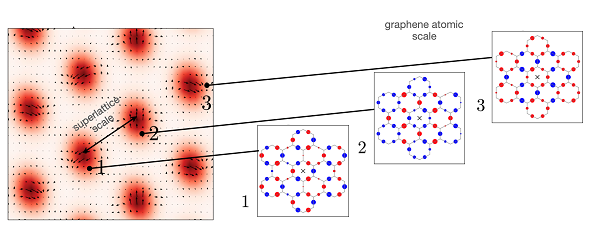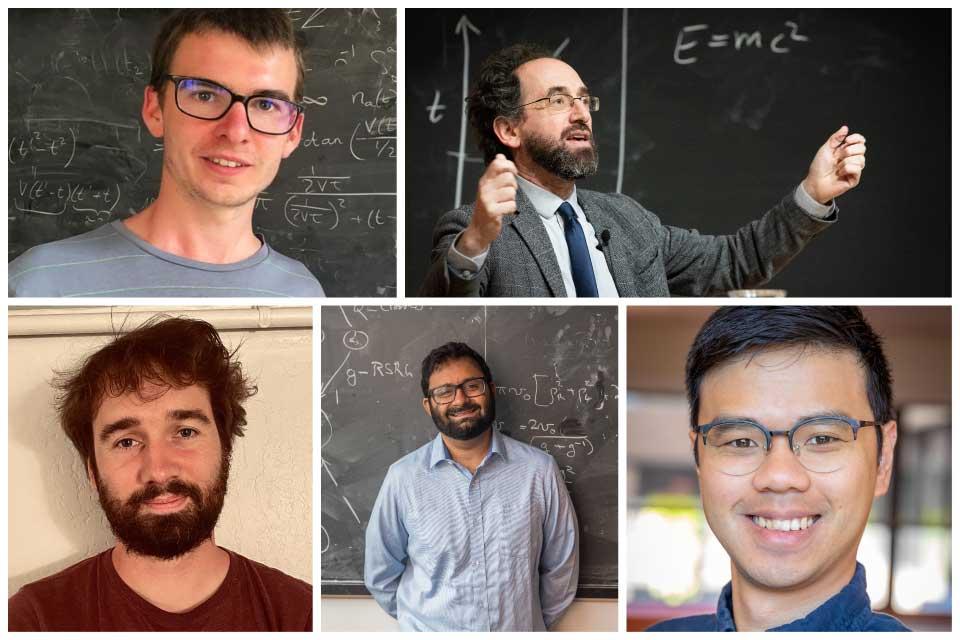A team of physicists from Oxford’s Rudolf Peierls Centre for Theoretical Physics has received a Frontiers of Science Award at the First International Congress of Basic Science in Beijing, China.
The award was given to former DPhil students Dr Glenn Wagner and Dr Yves Kwan, who are now postdoctoral fellows at the University of Zurich and Princeton University, respectively; Dr Nick Bultinck, a former Royal Society University Research Fellow at Oxford who is now on the faculty of Ghent University in Belgium; and Oxford RPC faculty Professors Steve Simon and Siddharth Parameswaran. The quintet of condensed matter theorists was recognised for contributions to understanding the physics of twisted bilayer graphene, a system built by layering two atomically thin sheets of carbon with a relative ‘magic angle’ twist of approximately one degree. The result is an example of a ‘moiré heterostructure’, in which quantum interference between the layers slows down electrons so much that the normally weak interactions between them become so strong that the electrons can form new phases of matter such as superconductors and magnets. The 2018 discovery of this class of ‘moiré materials’ – named after the long-wavelength pattern that develops upon twisting two layers – opened a new field of highly tunable two-dimensional quantum materials. However, many puzzles about the original twisted bilayers remained stubbornly unresolved – most notably, the precise nature of the variety of insulating states and the mechanism driving superconductivity.
A new form of order
In the 2022 paper in Physical Review Letters for which they were recognised, the Oxford team proposed a unified picture of the ‘normal’ state of the system: their theory describes twisted bilayer graphene at temperatures or densities where it is not superconducting. Using state-of-the-art numerical simulations and a careful analysis of symmetries, the authors were able to show that on incorporating a single new ingredient – the strain between the two layers – a variety of experimental measurements were consistent with a new form of order that they termed the ‘Kekulé spiral’. In this new state of matter (sketched below), the electron density forms an ordered pattern whose orientation breaks the six-fold symmetry of graphene, but which rotates over a period of hundreds of atoms corresponding to the scale over which the moiré pattern develops.

Although the Oxford team and their collaborators proposed this order in a 2021 Physical Review X paper, until recently the evidence in favour of it was indirect, by its consistency with electrical conductivity measurements. Remarkably, a pair of preprints earlier this year report separate experiments from Princeton University and the California Institute of Technology that directly imaged the intricate Kekulé spiral pattern using a scanning tunnelling microscope: while the Princeton team focused on the original bilayer material, the Caltech group found evidence for Kekulé spirals in closely-related trilayers, underscoring how universal this new state of matter could be.
Speaking about the award, Professor Siddharth Parameswaran said: ‘It’s very nice to receive such recognition from one’s colleagues [the prize committee comprises several experts in the area], and particularly gratifying to receive it for a theoretical idea that has been directly confirmed by experiments. Most of all, though, it makes me reflect what a privilege it is to work with junior researchers of the calibre of Glenn, Yves, and Nick – it’s wonderful that their contributions are being properly recognised already early in their careers.”
Frontiers of Science Awards
The Frontiers of Science Award is for work across 34 areas of mathematics, theoretical physics, and theoretical computer and information sciences, and is reserved for achievements reported in papers published in the last five years that are ‘of the highest scientific value and originality’ that have both had an important impact on their areas and been evaluated and accepted by scholars in the field. The prizes were announced at the opening ceremony of the First International Congress of Basic Science, held in the Great Hall of the People in Beijing, China on 16 July 2023. Of the 130+ papers recognised, only 16 were in the area of theoretical physics.
Among the six awardees in the area of theoretical condensed matter physics is another with Oxford connections. Professor Adam Nahum, a former Royal Society University Research Fellow at the Rudolf Peierls Centre and now on the faculty of the Ecole Normale Superieure in Paris, was recognised for his work on Measurement-induced phase transitions in the dynamics of entanglement, with co-authors Professor Brian Skinner of The Ohio State University, USA, and Professor Jonathan Ruhman of Bar-Ilan University, Israel.

